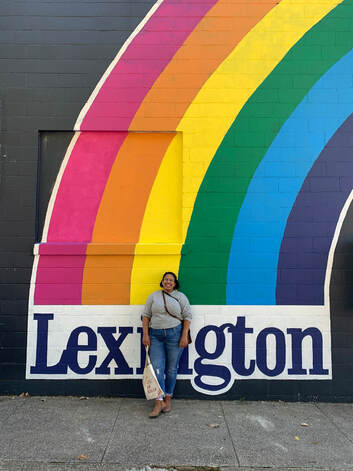EAT Lab Spotlights
We will be regularly recognizing lab members and showing them off through spotlights! Stay tuned and follow us on Twitter for updates: @uofleatlab
Summer 2020 EAT Lab Spotlight - Meet Graduate Student
Rowan Hunt!
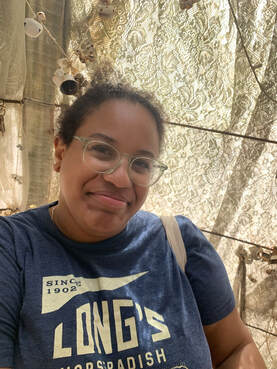
Where are you from?
Before grad school, I was living in Philadelphia — and I grew up outside of the city and it was nice to return for post-bacc!
What is your position at the EAT Lab (i.e., graduate student, research assistant, study coordinator, lab manager, etc.)?
I’m a (rising) second-year grad student in the lab.
How long have you been with the EAT Lab?
A little over one year!
What are your research interests?
I’m interested in the affective mechanisms (e.g., urgency, affective lability, emotion regulation) underlying eating disorders and other impulsive behaviors. Additionally, I’m interested in understanding how those affective mechanisms impact trajectories of illness, relapse, and recovery in EDs.
Before grad school, I was living in Philadelphia — and I grew up outside of the city and it was nice to return for post-bacc!
What is your position at the EAT Lab (i.e., graduate student, research assistant, study coordinator, lab manager, etc.)?
I’m a (rising) second-year grad student in the lab.
How long have you been with the EAT Lab?
A little over one year!
What are your research interests?
I’m interested in the affective mechanisms (e.g., urgency, affective lability, emotion regulation) underlying eating disorders and other impulsive behaviors. Additionally, I’m interested in understanding how those affective mechanisms impact trajectories of illness, relapse, and recovery in EDs.
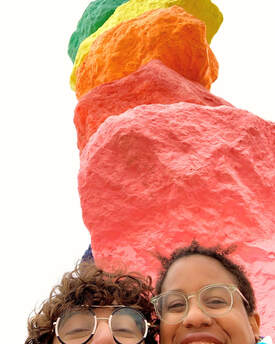
What has been your favorite project at the EAT Lab?
We do so much cool stuff, it’s almost hard to pick.... I’m super excited about our new study starting in the fall, but my favorite project thus far has been the Personalized Treatment Study. It's just such a cool study to be a part of!! From a methodological standpoint, I love that we’re using idiographic methods to approach treatment. From a clinician standpoint, I find it super rewarding to work with the participants and provide validating care that directly targets their personal symptoms.
What is your favorite thing about being a part of the EAT Lab?
Hands down, the collaborative environment. The lab is huge (and growing every day, it feels), and it's so nice to have the space to learn from so many talented individuals. We all come from different research backgrounds and have our own interests, and I find myself constantly growing as a researcher! I feel so lucky to be part of such a supportive, brilliant team of people who will geek out about science with me.
We do so much cool stuff, it’s almost hard to pick.... I’m super excited about our new study starting in the fall, but my favorite project thus far has been the Personalized Treatment Study. It's just such a cool study to be a part of!! From a methodological standpoint, I love that we’re using idiographic methods to approach treatment. From a clinician standpoint, I find it super rewarding to work with the participants and provide validating care that directly targets their personal symptoms.
What is your favorite thing about being a part of the EAT Lab?
Hands down, the collaborative environment. The lab is huge (and growing every day, it feels), and it's so nice to have the space to learn from so many talented individuals. We all come from different research backgrounds and have our own interests, and I find myself constantly growing as a researcher! I feel so lucky to be part of such a supportive, brilliant team of people who will geek out about science with me.
|
What are some of your greatest accomplishments during your time with the EAT Lab?
Wow, what a question! I haven’t been in the lab for that long, but I have to say that receiving honorable mention for my NSF GRFP grant was the highlight of my first year in the lab! Dr. Levinson and I discussed the NSF during my grad interview (before I was even in the lab), and it was surreal to actually join the lab and then submit the grant. Even though I wasn't funded, it was my first real foray into grant writing and I learned SO much from the process. What are your favorite things to do when you're not in the EAT Lab? When not working, I like to sit on the couch with my partner and watch bad reality television! I'm talking Vanderpump Rules, 90-day fiancé, the whole gamut. On a more intellectual note, I’m also an avid reader and enjoy cooking (and feeding people) immensely!! I can also make a playlist to fit any theme/event and have heard I'm a pretty good road trip buddy. |
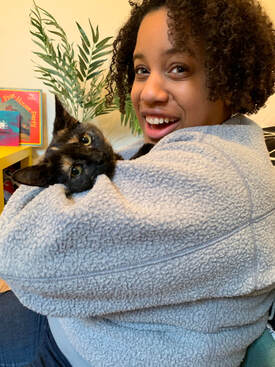
What do you hope to do when you become Dr. Rowan Hunt?
That feels so far off (**sweats nervously**), but I guess I ultimately hope to conduct research and develop treatments that make a difference in the lives of those with eating disorders. Whether that will be in an academic medical center or a university, that remains to be seen, but I know I definitely want to spend my career doing research (aka asking questions and getting answers)!
What advice would you give to future clinical psychology PhD students?
I feel like I got so much advice about the process, I got tons of advice about finding the right PI match and making sure I have the opportunities to do the research I wanted to, but nobody told me to think about the environment. Obviously, research and mentor fit are both important, but so are the lab/people! Working with people that you genuinely like (and want to hang out with outside of work) makes team science that more possible. It’s also nice to know that I’ll leave grad school not only with professional connections but also with lifelong friendships.
That feels so far off (**sweats nervously**), but I guess I ultimately hope to conduct research and develop treatments that make a difference in the lives of those with eating disorders. Whether that will be in an academic medical center or a university, that remains to be seen, but I know I definitely want to spend my career doing research (aka asking questions and getting answers)!
What advice would you give to future clinical psychology PhD students?
I feel like I got so much advice about the process, I got tons of advice about finding the right PI match and making sure I have the opportunities to do the research I wanted to, but nobody told me to think about the environment. Obviously, research and mentor fit are both important, but so are the lab/people! Working with people that you genuinely like (and want to hang out with outside of work) makes team science that more possible. It’s also nice to know that I’ll leave grad school not only with professional connections but also with lifelong friendships.
Spring 2020 EAT Lab Spotlight – Meet Graduate Student
Irina Vanzhula!
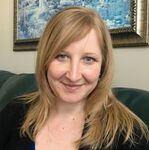
Where are you from?
I grew up in St-Petersburg, Russia and moved to the United States in 2007. I have also lived in Iowa and Illinois before moving to Louisville to attend graduate school.
What is your position at the EAT Lab (i.e., graduate student, research assistant, study coordinator, lab manager, etc.)?
I am a graduate student finishing up my 5th year in the program.
How long have you been with the EAT Lab?
I have been part of the EAT lab for the past 4 years. I transferred here from my old lab during my 2nd year of graduate school because I wanted to study eating disorder treatment. I am leaving the lab this year to complete my internship at the University of Chicago School of Medicine.
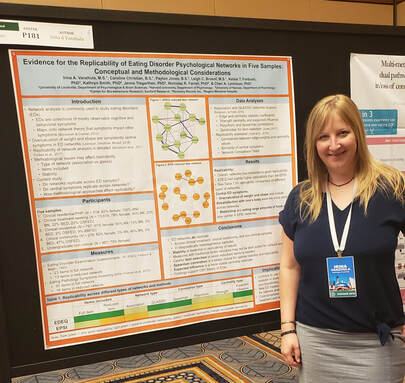
What are your research interests?
I have two main research interests. First, I am passionate about incorporating mindfulness and acceptance-based techniques into the treatment of eating disorders. My dissertation tested the effect of a brief mindfulness intervention on eating behaviors and eating disorder symptoms. My other interest is using novel statistical techniques to identify treatment targets for individuals with eating disorders. I am particularly interested in studying ways to adapt treatments to unique individual presentations.
What has been your favorite project at the EAT Lab?
Definitely the Personalized Treatment Study. Working on this study from its conception completely changed how I think about psychological treatment. Eating disorders look so different even in individuals with the same eating disorder diagnosis that it doesn't make sense to use the same treatment approach for everyone. In the Personalized Treatment Study, we collect data from each person over a few weeks and then develop a personalized conceptualization of their symptoms. We then match existing interventions with the most important symptoms. I think such personalized treatment approaches are the future.
What is your favorite thing about being a part of the EAT Lab?
The endless opportunities. Since I joined the EAT Lab, I have felt like a kid in a candy store. I was able to conduct two of my own studies on mindfulness, travel to statistical workshops, publish multiple papers, and meet other professionals in the field and collaborate with them on research projects. I also love the creative scientific atmosphere of the EAT Lab. Everyone is so passionate about eating disorder treatment, and novel research ideas spark and flourish here.
I have two main research interests. First, I am passionate about incorporating mindfulness and acceptance-based techniques into the treatment of eating disorders. My dissertation tested the effect of a brief mindfulness intervention on eating behaviors and eating disorder symptoms. My other interest is using novel statistical techniques to identify treatment targets for individuals with eating disorders. I am particularly interested in studying ways to adapt treatments to unique individual presentations.
What has been your favorite project at the EAT Lab?
Definitely the Personalized Treatment Study. Working on this study from its conception completely changed how I think about psychological treatment. Eating disorders look so different even in individuals with the same eating disorder diagnosis that it doesn't make sense to use the same treatment approach for everyone. In the Personalized Treatment Study, we collect data from each person over a few weeks and then develop a personalized conceptualization of their symptoms. We then match existing interventions with the most important symptoms. I think such personalized treatment approaches are the future.
What is your favorite thing about being a part of the EAT Lab?
The endless opportunities. Since I joined the EAT Lab, I have felt like a kid in a candy store. I was able to conduct two of my own studies on mindfulness, travel to statistical workshops, publish multiple papers, and meet other professionals in the field and collaborate with them on research projects. I also love the creative scientific atmosphere of the EAT Lab. Everyone is so passionate about eating disorder treatment, and novel research ideas spark and flourish here.
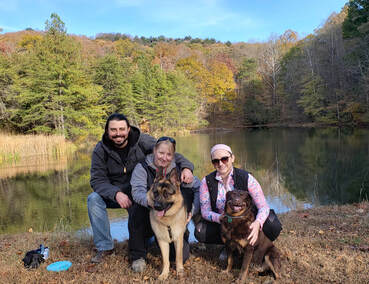
What are some of your greatest accomplishments during your time with the EAT Lab?
There are 2 events that I see as my professional capstones. In September, I taught a workshop about assessment and treatment of eating disorders at the Conference on Mental Health Practice in Rural/Underserved Settings in Murray, KY. Educating other professionals about my field of study was very rewarding. A few months ago, Dr. Levinson and I co-led an Academy of Eating Disorders webinar on conducting network analysis - a novel statistical technique in the field of psychology. Both are testimonials to how the EAT Lab helped me grow into a strong clinician and a researcher.
What are your favorite things to do when you're not in the EAT Lab?
I love hiking with my 85-lb German Shepherd, Ragnar. His favorite thing is chasing a frisbee down the hill. I also enjoy trying new restaurants and in general visiting places where I haven't been before. On occasion, I get out my sewing machine and make new curtains or a blanket.
There are 2 events that I see as my professional capstones. In September, I taught a workshop about assessment and treatment of eating disorders at the Conference on Mental Health Practice in Rural/Underserved Settings in Murray, KY. Educating other professionals about my field of study was very rewarding. A few months ago, Dr. Levinson and I co-led an Academy of Eating Disorders webinar on conducting network analysis - a novel statistical technique in the field of psychology. Both are testimonials to how the EAT Lab helped me grow into a strong clinician and a researcher.
What are your favorite things to do when you're not in the EAT Lab?
I love hiking with my 85-lb German Shepherd, Ragnar. His favorite thing is chasing a frisbee down the hill. I also enjoy trying new restaurants and in general visiting places where I haven't been before. On occasion, I get out my sewing machine and make new curtains or a blanket.
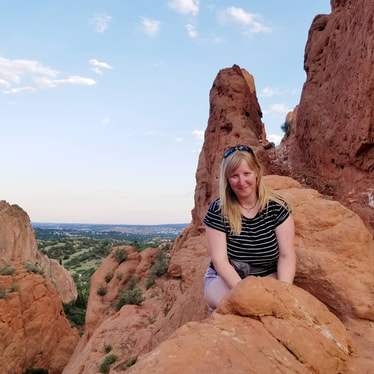
What do you hope to do when you become Dr. Irina Vanzhula?
I would love to be in a position where I can continue to do research in eating disorder treatment and spend some time seeing patients. My best research ideas usually come from clinical work. I also want to have an opportunity to mentor young researchers and clinicians. I have greatly enjoyed mentoring undergraduate students in the EAT Lab and find it very rewarding to see their accomplishments.
What advice would you give to future clinical psychology PhD students?
Expect graduate school to break you down and build you back up into a professional. The journey will seem hard, long, and tedious, and you will doubt yourself regularly, but it’s all part of the process. One day towards the end you will see yourself giving a presentation or helping a client, and you will realize you are now a young professional in your field. That moment is worth it.
I would love to be in a position where I can continue to do research in eating disorder treatment and spend some time seeing patients. My best research ideas usually come from clinical work. I also want to have an opportunity to mentor young researchers and clinicians. I have greatly enjoyed mentoring undergraduate students in the EAT Lab and find it very rewarding to see their accomplishments.
What advice would you give to future clinical psychology PhD students?
Expect graduate school to break you down and build you back up into a professional. The journey will seem hard, long, and tedious, and you will doubt yourself regularly, but it’s all part of the process. One day towards the end you will see yourself giving a presentation or helping a client, and you will realize you are now a young professional in your field. That moment is worth it.
We wish you the best of luck on internship, Irina!

